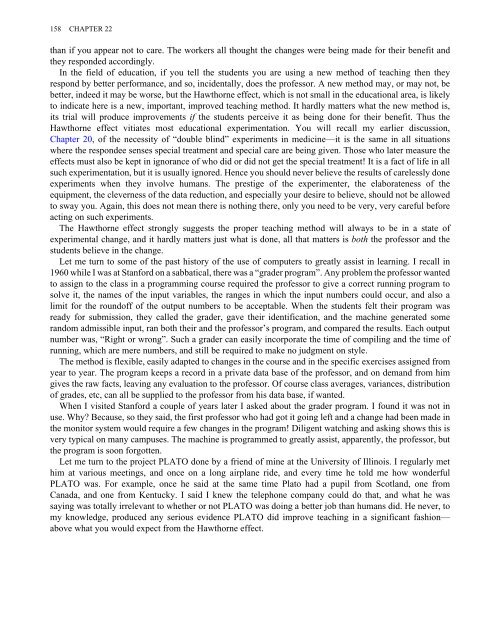hamming
hamming
hamming
Create successful ePaper yourself
Turn your PDF publications into a flip-book with our unique Google optimized e-Paper software.
158 CHAPTER 22than if you appear not to care. The workers all thought the changes were being made for their benefit andthey responded accordingly.In the field of education, if you tell the students you are using a new method of teaching then theyrespond by better performance, and so, incidentally, does the professor. A new method may, or may not, bebetter, indeed it may be worse, but the Hawthorne effect, which is not small in the educational area, is likelyto indicate here is a new, important, improved teaching method. It hardly matters what the new method is,its trial will produce improvements if the students perceive it as being done for their benefit. Thus theHawthorne effect vitiates most educational experimentation. You will recall my earlier discussion,Chapter 20, of the necessity of “double blind” experiments in medicine—it is the same in all situationswhere the respondee senses special treatment and special care are being given. Those who later measure theeffects must also be kept in ignorance of who did or did not get the special treatment! It is a fact of life in allsuch experimentation, but it is usually ignored. Hence you should never believe the results of carelessly doneexperiments when they involve humans. The prestige of the experimenter, the elaborateness of theequipment, the cleverness of the data reduction, and especially your desire to believe, should not be allowedto sway you. Again, this does not mean there is nothing there, only you need to be very, very careful beforeacting on such experiments.The Hawthorne effect strongly suggests the proper teaching method will always to be in a state ofexperimental change, and it hardly matters just what is done, all that matters is both the professor and thestudents believe in the change.Let me turn to some of the past history of the use of computers to greatly assist in learning. I recall in1960 while I was at Stanford on a sabbatical, there was a “grader program”. Any problem the professor wantedto assign to the class in a programming course required the professor to give a correct running program tosolve it, the names of the input variables, the ranges in which the input numbers could occur, and also alimit for the roundoff of the output numbers to be acceptable. When the students felt their program wasready for submission, they called the grader, gave their identification, and the machine generated somerandom admissible input, ran both their and the professor’s program, and compared the results. Each outputnumber was, “Right or wrong”. Such a grader can easily incorporate the time of compiling and the time ofrunning, which are mere numbers, and still be required to make no judgment on style.The method is flexible, easily adapted to changes in the course and in the specific exercises assigned fromyear to year. The program keeps a record in a private data base of the professor, and on demand from himgives the raw facts, leaving any evaluation to the professor. Of course class averages, variances, distributionof grades, etc, can all be supplied to the professor from his data base, if wanted.When I visited Stanford a couple of years later I asked about the grader program. I found it was not inuse. Why? Because, so they said, the first professor who had got it going left and a change had been made inthe monitor system would require a few changes in the program! Diligent watching and asking shows this isvery typical on many campuses. The machine is programmed to greatly assist, apparently, the professor, butthe program is soon forgotten.Let me turn to the project PLATO done by a friend of mine at the University of Illinois. I regularly methim at various meetings, and once on a long airplane ride, and every time he told me how wonderfulPLATO was. For example, once he said at the same time Plato had a pupil from Scotland, one fromCanada, and one from Kentucky. I said I knew the telephone company could do that, and what he wassaying was totally irrelevant to whether or not PLATO was doing a better job than humans did. He never, tomy knowledge, produced any serious evidence PLATO did improve teaching in a significant fashion—above what you would expect from the Hawthorne effect.


